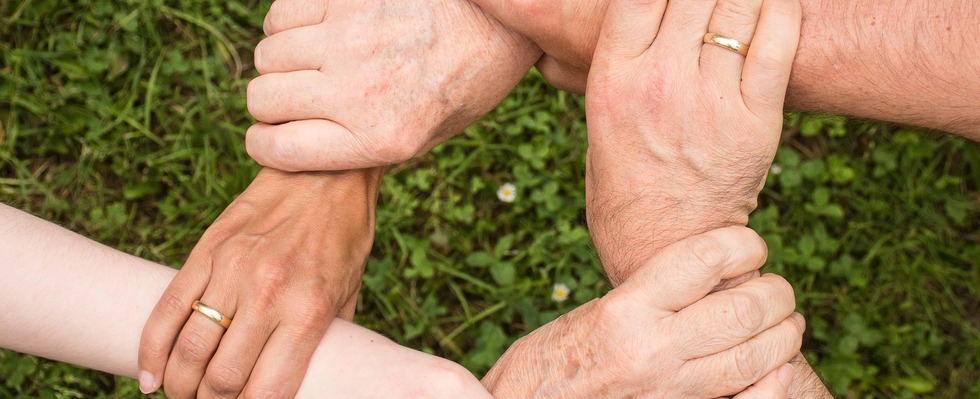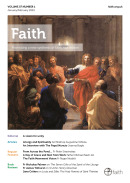A vision for unity
It is important to look ahead with hope and realism. This is a season of fresh beginnings. Let’s look forward in hope.
For the past several decades, every January has seen a Week of Prayer for Christian Unity in churches across Britain. This admirable initiative has, however, reached a rather bleak stage in these first decades of the 21st century. The interest and pleasure at a local level associated with visiting different churches in a neighbourhood has waned: We are all glad of the goodwill and the ending of long-ago prejudices, but there is nothing very novel about that now. Above all, however, there is a new situation, produced by ideas and attitudes unthinkable in the Britain of the 1970s.
The Anglican Church now deems the blessing of same-sex unions to be acceptable: the Church in Wales has authorised and formalised such blessings with its Bishop of St Asaph enthusing. The decision was taken following a vote by the Governing Body. Thus, the doctrine in marriage for members of that denomination in Wales has been changed.
Not a small matter
This is not a small matter: Marriage between a man and a woman is the primordial sacrament, described in the Catholic wedding liturgy as “the one blessing not destroyed by Original Sin, or washed away in the flood.” It is God’s plan for humanity, central to his desire for the salvation of the human race. It is intimately and deeply rooted in the marriage of Christ and his Church – a nuptial bond, renewed in every celebration of the Eucharist.
Back in the 1970s Christians of all denominations were able to stand together to affirm marriage as the lifelong union of a man and a woman and the centrality of family life. The author of this Editorial recalls attending an ecumenically-based rally in London’s Trafalgar Square on this theme, with a call for “purity, love, and family life.”
Today, the Catholic Church stands firm, and some Evangelical Christians do, too – but leading Anglican figures once thought to belong to that last category have crumbled. Dr Justin Welby has said that he cannot speak on the subject of whether or not two men could marry, as the Church of England is still debating the issue. If the Archbishop of Canterbury cannot affirm that marriage is the union of a man and a woman, then we have reached a bleak stage indeed.
It’s all rather sad. When Pope – now Saint – John Paul II came to Britain forty years ago he walked up the aisle of Canterbury Cathedral with Dr Runcie, the then Archbishop of Canterbury, and there was general goodwill. It was – and is – good that the bitterness of the 16th and 17th centuries has gone. But where do we go now? Overtures from the Catholic side have been met with embarrassing awkwardness – to put it mildly – from the Anglicans.
There are rich and important Anglican traditions – in liturgy, in glorious hymns, in love of village churches. The Church of England has nourished the faith of millions over a long period and has its heroes and heroines including well-known figures such as William Wilberforce and Florence Nightingale. When Pope Benedict XVI created the Ordinariate of Our Lady of Walsingham for Anglicans coming into full communion with the Catholic Church, it was precisely with this heritage in mind: prayers in beautiful language, music that lifts the heart, projects serving the common good, traditions woven into the lives of so many people.
A false ecumenism
And the Ordinariate found support among Anglicans who longed for clear teaching, and who responded to the papal call. Only through a true affirmation of Christ as Divine can any form of Christian unity be established. This has been something emphasised by the Faith Movement from its foundation in the 1970s. Fr Edward Holloway wrote in 1979 about the danger of a false ecumenism which “seeks to reunite Christians without a clear recognition of the literal Divinity of Christ fundamental to the preaching of the gospel to all nations,” and emphasised that this must include “an equally clear recognition that this gospel of Divinity implies a divine, an infallible magisterium of the spoken word” (Faith magazine March/April 1979).
Going forward?
How to go forward? There are useful local projects helping the homeless and needy. There is support and encouragement between Catholics and some groups that hold fast to Evangelical beliefs with co-operation in defending human life and opposing euthanasia and abortion. But beyond that…it’s not easy to see a way forward. The Methodist denomination – which has affirmed its support for same-sex marriage in clear terms – is closing many churches and seems to have lost its connection with the Christian message taught by John Wesley. Other groups seem to lack a coherent specific leadership with which dialogue can be taken forward. Small independent denominations can link up, as described, with Catholics at a local level. But that is about all.
Don’t let’s give up. We have all learned some lessons from history. It was noble and right that St John Paul took the lead, in his message at the Millennium, noting that the Catholic Church had not always acted in accordance with the values of the Gospel and saying “We forgive and we ask forgiveness! . . . We cannot not recognize the betrayals of the Gospel committed by some of our brothers, especially during the second millennium. We ask forgiveness for the divisions between Christians, for the use of violence that some have resorted to in the service of truth and for the acts of dissidence and of hostility sometimes taken towards followers of other religions.” That opened a door which remains open.
Specifics
Could we do more with the Ordinariate? Probably. Fr Michael Nazir-Ali, former Anglican Bishop of Rochester and a distinguished contributor to FAITH magazine, has strong bonds with the Evangelical tradition of the Anglican communion. A welcome awaits more arrivals from this tradition. It will be important to emphasise this. The Ordinariate has been associated with rather “high Church” liturgies and this can be off-putting to some: a wider use of the Ordinariate form, which does not seek to imitate the Extraordinary Form of the Mass, would be useful. And – oh, we have been pleading for this for years – our Bishops need to speak clearly, and to be seen and heard speaking clearly – in defence of the Church’s unchanging and unchangeable doctrines and moral teachings. These are not irritating random rules, but glorious truths that enable human lives to flourish and community life to be neighbourly and centred on solidarity and goodwill.
Finally, let’s be clear about some specifics. The Church’s deep understanding of the difference between male and female is going to be more and more strongly taught over the next years. A male priesthood is more important than had been previously understood: that is why Pope Francis has made it a matter for excommunication if anyone tries to ordain a woman. Marriage as the lifelong union of a man and a woman, open to new life, was instituted by God and is a sacrament – it cannot be changed to include three people, or five, or members of the same sex, or to become a series of temporary arrangements, or anything of that sort. Mothers and fathers have the right and duty to pass on the Church’s teachings to their children. A priest who hears some one’s confession in the Sacrament of Reconciliation can never, under any circumstances, reveal what he has heard. Those are just some specifics that, in these days of a shouting Internet, need reaffirming. Consult the Catechism of the Catholic Church for more. And pray for authentic Christian unity “that the world may believe” (John 17:21).
God as the true Environment of men
The FAITH Movement has something very specific to offer. We offer “a vision of God as the true Environment of men in whom ‘we live and move and have our being’ and of his unfolding purpose in the relationship of word and grace through the prophets which is brought to its true head in Jesus Christ, the Son of God, Lord of Creation, centre of history and fulfilment of our humanity.”
“Our redemption through the death and resurrection of the Lord, following the tragedy of original sin, is also thereby seen in its crucial and central focus. Our life in his Holy Spirit through the Church and the sacraments and the necessity of an infallible magisterium likewise flow naturally from this presentation of Christ and his work through the ages.”
“Our understanding of the role of Mary, the Virgin Mother through whom the Divine Word comes into his own things in the flesh (cf John 1: 1014) is greatly deepened and enhanced through this perspective. So too the dignity of Man, made male and female as the sacrament of Christ and his Church (cf Ephesians 5:32) is strikingly reaffirmed, and from this many of the Church’s moral and social teachings can be beautifully explained and underlined.” (from the Aims and Ideals of the Faith Movement).






